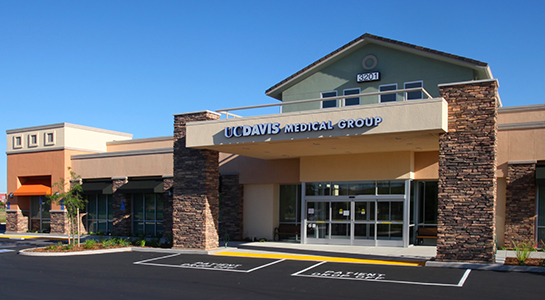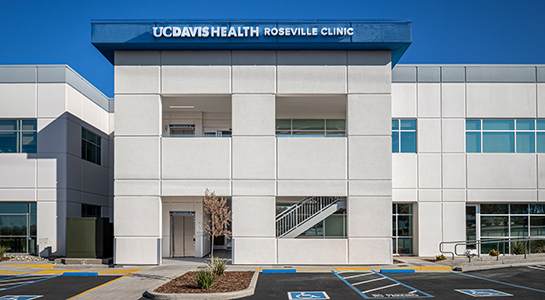Gestational Diabetes
We offer gestational diabetes testing, education and management throughout your pregnancy.
Medically reviewed by Nancy Field, M.D. on Sep. 05, 2023.

What Is Gestational Diabetes?
Gestational diabetes is a condition that causes your blood sugar to get too high during pregnancy. It’s a form of diabetes that can affect women who don’t already have type 1 or type 2 diabetes when they get pregnant.
Gestational diabetes affects up to 10-15% of pregnancies in the U.S. For most women, the condition goes away on its own after pregnancy. But gestational diabetes can increase their chances of developing type 2 diabetes after pregnancy by about 50%.
At UC Davis Health, we offer complete care for gestational diabetes. Obstetricians and diabetes specialists work together to give you the education, testing and treatment you need. We focus on reducing the risk of pregnancy complications and helping you have the joyful experience you deserve.
Gestational Diabetes Symptoms
Gestational diabetes doesn’t usually cause symptoms. If it does, they’re very mild. Most people with gestational diabetes aren’t aware that they have the condition until they receive a test.
Common Gestational Diabetes Symptoms
Some people with gestational diabetes experience:
- Excessive thirst
- Fatigue
- Frequent urination
- Nausea
Gestational Diabetes Causes and Risk Factors
During pregnancy, your body may not produce or use insulin as it should. Insulin is a hormone that breaks down glucose (a type of sugar) from food and converts it to energy. Changes to your body during pregnancy, such as hormonal fluctuations and weight gain, can affect how effectively insulin works. This can also cause your blood sugar to get too high.
You are at a higher risk for gestational diabetes if you have any of the following risk factors. Talk with your provider to learn more about your risk.
Health History
A history of high blood pressure, heart disease, prediabetes or hormone disorders, such as polycystic ovary syndrome (PCOS), increases your risk of gestational diabetes.
Physical Inactivity
Exercise helps insulin work better and keep blood glucose levels in check. Not exercising puts you at a higher risk of diabetes.
Race and Ethnicity
Rates of gestational diabetes are higher in people who are Black, American Indian or Alaska Native, Asian, Hispanic/Latino or Pacific Islander.
Weight
Having excess weight or obesity can affect the way insulin works in your body, increasing your chances of diabetes during pregnancy.
Diagnosing Gestational Diabetes
We use blood tests to diagnose gestational diabetes during your second trimester, between 24 and 28 weeks of pregnancy. We may recommend earlier testing if you’re at a higher risk of gestational diabetes.
Tests include:
- Glucose screening test: This test is also called a glucose challenge test. You drink a sweet liquid containing glucose. We wait one hour and do a blood test to check your blood glucose level. If your blood glucose is high, we do an oral glucose tolerance test.
- Oral glucose tolerance test (OGTT): We test your blood sugar before and after you consume a larger dose of glucose. We test your blood sugar one, two and three hours after your glucose drink.
Gestational Diabetes Treatments
There are several ways that you can manage gestational diabetes, including at-home monitoring, diet, exercise and possibly medication. Your healthcare provider will make a treatment plan that fits your needs.
It’s very important to control gestational diabetes during your pregnancy. Uncontrolled high blood sugar increases the risk of:
- Birth injuries
- Cesarean section (C-section)
- Macrosomia (larger than average fetus)
- Preeclampsia (high blood pressure during pregnancy)
- Preterm birth (live birth before 37 weeks of pregnancy)
- Stillbirth (death of baby after 20 weeks of pregnancy)
At-Home Glucose Monitoring
You will use a blood sugar meter to measure your blood glucose levels at home when you first get up in the morning and after each meal. Your healthcare provider will explain your target range and tell you what to do if your blood sugar gets too high.
Diet
Your gestational diabetes diet should include fruits, vegetables, whole grains and lean proteins. We can connect you to a registered dietitian who can help you build a nutrition plan specifically to manage diabetes.
Exercise
Low-impact aerobic exercise, such as walking, swimming or yoga, is ideal for pregnant people. Talk to your healthcare provider about safe ways to stay active.
Insulin
Your healthcare provider may recommend insulin if diet and exercise aren’t enough to keep your blood glucose under control. Your provider will explain how and when you should take insulin.
Preventing Gestational Diabetes
You can reduce your risk of gestational diabetes by maintaining a healthy body weight and getting regular exercise before you get pregnant.
How common is it?
<10%Of pregnant women develop gestational diabetes
Pregnant women who had gestational diabetes are
50%More likely to develop type 2 diabetes after pregnancy
Source: Centers for Disease Control and Prevention (CDC): Gestational Diabetes
Request an Appointment
As Sacramento's No. 1 hospital, you'll benefit from unique advantages in primary care and specialty care. This includes prevention, diagnosis and treatment options from experts in 150 specialties.
Referring Physicians
To refer a patient, submit an electronic referral form or call.
800-4-UCDAVIS
Patients
Call to make an appointment.
Consumer Resource Center
800-2-UCDAVIS
We offer diabetes diagnosis and treatment at four of our clinics throughout the Sacramento region.
-

Elk Grove
See more clinic informationarrow_forwardlocation_on 8110 Laguna Blvd., Elk Grove, CA 95758
call 916-683-3955
-

Folsom
See more clinic informationarrow_forwardlocation_on 14264 Innovation Drive, Folsom, CA 95630
call 916-946-1700
-

Rancho Cordova
See more clinic informationarrow_forwardlocation_on 3201 Data Drive, Rancho Cordova, CA 95670
call 916-851-1440
-

Roseville
See more clinic informationarrow_forwardlocation_on 1620 E. Roseville Pkwy., Roseville, CA 95661
call 916‑783‑7109

Ranked among the nation’s best hospitals
A U.S. News & World Report best hospital in cardiology, heart & vascular surgery, diabetes & endocrinology, ENT, geriatrics, neurology & neurosurgery, and pulmonology & lung surgery.

Ranked among the nation’s best children’s hospitals
U.S. News & World Report ranked UC Davis Children’s Hospital among the best in pediatric nephrology, orthopedics*, and pulmonology & lung surgery. (*Together with Shriners Children’s Northern California)

Ranked Sacramento’s #1 hospital
Ranked Sacramento’s #1 hospital by U.S. News, and high-performing in aortic valve surgery, back surgery (spinal fusion), COPD, colon cancer surgery, diabetes, gynecological cancer surgery, heart arrhythmia, heart failure, kidney failure, leukemia, lymphoma & myeloma, lung cancer surgery, pacemaker implantation, pneumonia, prostate cancer surgery, stroke, TAVR, cancer, orthopedics, gastroenterology & GI surgery, and urology.

The nation’s highest nursing honor
UC Davis Medical Center has received Magnet® recognition, the nation’s highest honor for nursing excellence.

World-class cancer care
One of ~59 U.S. cancer centers designated “comprehensive” by the National Cancer Institute.

A leader in health care equality
For the 13th consecutive year, UC Davis Medical Center has been recognized as an LGBTQ+ Healthcare Equality Leader by the educational arm of America’s largest civil rights organization.

